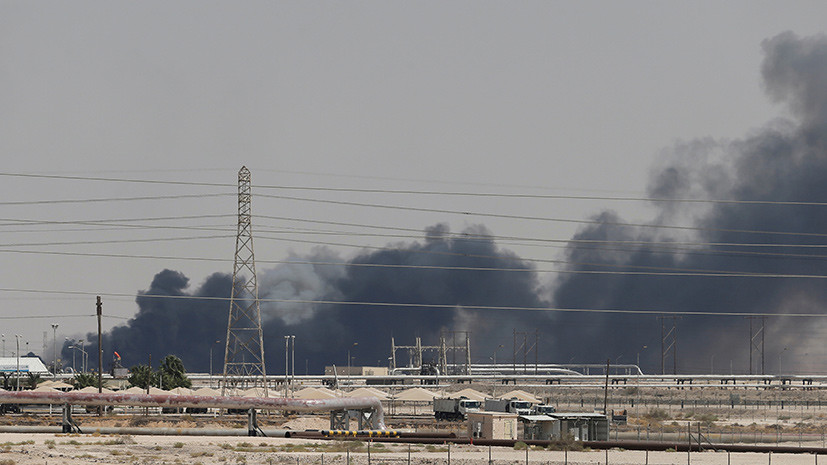Russian President Vladimir Putin held telephone conversations with the Crown Prince and the Minister of Defense of Saudi Arabia, Mohammed bin Salman Al Saud. This was reported by the press service of the Russian leader.
“The situation in connection with the attack on oil refineries in Saudi Arabia was discussed. The President of Russia expressed concern in this regard and spoke out for a thorough and objective investigation of what happened, ”the Kremlin’s press service said in a statement.
Earlier it was reported that oil supplies, which were reduced after the drone attack on oil refineries in Saudi Arabia, were fully restored. On Tuesday, September 17, said Minister of Energy Abdel Aziz bin Salman Al Saud.
“Production has returned to normal since noon today,” he said. (Company Saudi. - RT ) Aramco will fulfill its obligations to customers this month, using a strategic reserve, ”TASS reports the Minister.
In addition, the official noted that Saudi Arabia has already restored half the volume of oil production, and by the end of September the country's oil market will fully recover.
“Over the past two days the damage has been eliminated, more than half of the production level to the attacks has been restored,” he said.
The attacks did not affect deliveries to the domestic market, the minister added. According to him, by the end of the month, oil production in the country will increase to 11 million barrels per day. Now the kingdom produces about 10 million barrels. By the end of November, Saudi Arabia intends to bring oil production to 12 million barrels per day.
On September 18, in a conversation with South Korean President Moon Jae In, the Crown Prince of Saudi Arabia, Mohammed bin Salman Al Saud, announced that the kingdom would fully restore oil production in 10 days.
On September 14, two refineries of the state-owned company Saudi Aramco in the Abkaik and Khurais districts in Saudi Arabia were attacked by drones, resulting in fires at the plants. According to the Saudi Minister of Energy, the attack led to a drop in oil supplies by more than 5.7 million barrels of oil, which is 50% of the company's production.
Hussite rebels, currently fighting against the kingdom as part of the conflict in Yemen, claimed responsibility for the attack. Hussite spokesman Yahya Sari said on Al Masirah that the attacks will continue until the Yemeni war is over.
At the same time, the United States directly accused Iran of assault.
“Amid all the calls for de-escalation, Iran launched an unprecedented attack on global energy supplies. There is no evidence that the attacks were from Yemen, ”said United States Secretary of State Mike Pompeo.
- Smoke is seen following a fire at Aramco facility in the eastern city of Abqaiq, Saudi Arabia, September 14, 2019
- Reuters
US Senator Lindsay Graham, in turn, called for strikes already at Iran’s oil refineries in order to influence the behavior of the Islamic Republic.
“Tehran will not cease to act inappropriately until it is faced with the threat of more tangible consequences such as strikes at its factories that will break the backbone of the regime,” the politician said on his Twitter.
On September 17, AFP reported citing an unnamed American official that the US was gathering evidence of Iran’s involvement in the attack and was preparing to submit it to the UN General Assembly next week.
In Saudi Arabia, they are going to share such evidence on Wednesday, September 18, this was reported by Al Arabiya.
Meanwhile, Iran categorically denies any involvement in attacks on Saudi oil refineries. In particular, this was stated by Minister of Defense Amir Khatami.
“It is clear that there is a conflict between the two countries (Yemen and Saudi Arabia). One of the parties to the conflict - Yemen - has openly assumed responsibility for the attacks, ”ISNA reports.
In addition, the head of the defense department spoke about the reasons that could provoke a terrorist attack.
"The reason for the Yemeni drone attack is clear: for many years, the Yemenis have suffered from brutal armed attacks by the Saudi coalition and are in a critical position due to the blockade imposed by Saudi Arabia," he said.
Long term effects
Despite the fact that Saudi Arabia behaved correctly in a crisis situation, demonstrating maximum openness to the world, it also showed weak protection of its oil infrastructure, said Alexander Frolov, deputy director general of the Institute of National Energy, told RT. In his opinion, in the future this will lead to higher prices for “security equipment”.
“The Yemeni attack showed one simple thing. Saudi Arabia is not only vulnerable, it is defenseless, in fact. In general, the question here is not only whether the Saudis will be able to restore the damaged infrastructure, but whether they will be able to strengthen protection measures so that such situations do not happen again, ”the expert said.
In addition, the attacks once again prove that, with all its significance, the Middle East is an extremely unstable region in all respects, said Stanislav Mitrakhovich, an expert at the National Energy Security Fund. It should be taken into account, for example, that destabilization in the region raises world oil prices, he notes. In addition, in his opinion, a clash between the United States and Iran is very likely.
“If the USA says that Iran really stood behind those who launched these drones, then I do not exclude that the USA will increase pressure on Iran, sanction pressure at least. And I do not exclude that the matter, at some stage, for example after the election a year later, may reach the military scenario, ”Mitrahovich told RT.

